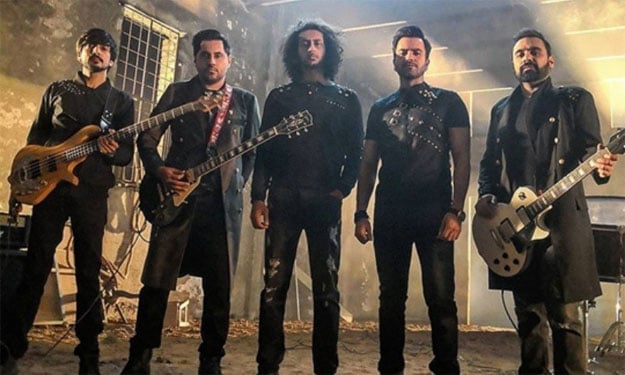
His vision of a thriving contemporary music scene has as much to do with other art forms as it does with music. Gone are the days where music was only a listening experience. Today, it’s more immersive. It has to be.
 PHOTO: PUBLICITY
PHOTO: PUBLICITY“Our challenges are different today. I think more than competition among musicians, there is competition of music with other forms of entertainment. Therefore, I think new acts should combine multiple art forms. I did the same with Meesha Shafi’s Mein where we married theatre and music. People want to see different art forms come together to create an unforgettable experience. And I know new bands are trying to do that, because the main focus should be to get people back to concerts and live music,” Xulfi tells The Express Tribune.
“Music and other art forms have to collaborate. And in their marriage, music will again become a top entertainment choice for people. Then you will see more artists and songwriters. Times have changed but there are many artists with the potential to be stars.”
 PHOTO: PUBLICITY
PHOTO: PUBLICITYXulfi’s suggestion forms a vivid picture of Pakistan’s music industry. In yesteryears, we produced stars such as Atif Aslam and Ali Zafar. While we do see new acts coming to the fore lately, there is barely an infrastructure which can elevate emerging artists to the next level. “The era you are talking about was different,” Xulfi begs to differ.
“There weren’t many options for entertainment. Nowadays, you have a cellphone and with it, a million ways to be entertained. There is so much else happening around you. At that time, music channels had the highest ratings because TV was one of the biggest sources of entertainment. So an opportunity automatically presented itself, due to which people listened to our music and many stars were born.”
 PHOTO: PUBLICITY
PHOTO: PUBLICITYThe Call guitarist believes our entertainment industry is at a different stage now. While platforms, which present the rather established artists, create certain believability that there’s music happening in the country, Xulfi believes “music has to be an ongoing conversation.” He states, “Music can’t be a conversation only when a certain platform is involved. Platforms are important but they should only now help this conversation get bigger, a conversation that doesn’t expire.”
The conversation he talks about will get bigger if we change our approach towards discovering artists and propagating their art today. From the current crop of musicians, Xulfi sees a number of young talented acts which he thinks have a lot of potential “to go to that next level”. He names Bayaan, Kashmir, Karakoram, Lio Twins and Badnaam as some of those acts for whom he’s genuinely happy as “they’re all pursuing their dreams”.
 PHOTO: PUBLICITY
PHOTO: PUBLICITYBut chasing their dreams comes with a lot of struggle in an industry like ours where it’s difficult to survive if we remove social media from the equation. The perspective changes from where an artist, emerging or established, stands.
Given the market saturated with Sufi rock and remixes of classics, does Xulfi think there is a clash of genres in the industry? “I believe there should be healthy competition. Whatever genre you like; you fight for it. You fight for your form of music and improve it. To put in a different way, there should be bands of different genres performing and creating music. You see this happening in other countries. A healthy banter between musicians helps their industry evolve.”
 PHOTO: PUBLICITY
PHOTO: PUBLICITYXulfi places importance on the audience’s desires. “Whoever performs a certain genre of music, they should do it with an honest essence. They need to understand that audience is the one who decides. And when I say that, I mean they need to inspire our audience to have a place in their hearts for Pakistani music. And this is the need of the hour.”
He says there is a lot of space for so many different artists, different genres and forms of music that everyone can come and prove their mettle. “So yes, I can see artists turning into great musicians. I can see a little healthy competition beginning to happen here as well. It’s a good sign. Now it just needs to translate into performances so that audience can come and enjoy.”
Xulfi continues, “However, I’d say, since I’ve been involved in the mainstream music industry, I have seen a clash between pop and rock music. It’s been a friendly tussle for both, artists and the audience alike. When we started doing our music, during the time of EP and then Call, it was dominantly rock. Then we saw other pop artists come in and get the audience’s attention."
 PHOTO: PUBLICITY
PHOTO: PUBLICITY"It encouraged us to do better and gain their attention back. And then the pop artists would try to do the same. So, as far as the competitive mentality is concerned, this clash exists here and everywhere in the world. And it is so much fun because we were all friends in life, but on stage, we knew the game was on. We tried to outdo each other in concerts and this is the spirit that we need today. That’s how we all improve. So, in a way, competition leads us to collaborative improvement and progress.”
Looking at the current state of local music scene, more than pop and rock, one might find a lot of new (as well as older) acts over-relying on Sufi poetry to create new music. The veteran musician agrees to an extent and associates the audience’s lack of exposure to this trend.
“We don’t help our audience get exposed to different forms of music. Yes, we depict the Sufi form in a way that our audience connects to it. Because it’s so rooted in our fabric, it’s natural to like it. But have we presented any other genre like this?” mentions Xulfi. “We need to have a consistent effort in that direction too so that people can believe that other forms can happen, so that they can believe there are other genres of music they can love to experience. That’s the only way music can survive in our country.”
 PHOTO: PUBLICITY
PHOTO: PUBLICITYEven though he believes the new generation of musicians is aware of this, he also emphasises the need of songwriters who can compose original songs.
“You see, there are many good songwriters in the country. But when you show someone a dream that they can be celebrities and stars without it, they believe that they can fulfill the dream with singing only. The big stars we look up to today are not only good singers but also songwriters,” he says. “Since 1990s, we have seen songwriters, who also sing well, succeed. The point is we need songwriters and musicians in our country with a right focus and an ecosystem that can support them so that everyone collaborates to create magic. That should be the end result of this.”
Have something to add to the story? Share it in the comments below.


1719660634-1/BeFunky-collage-nicole-(1)1719660634-1-165x106.webp)

1732276540-0/kim-(10)1732276540-0-165x106.webp)
1732274919-0/Express-Tribune-(9)1732274919-0-270x192.webp)
1732271986-0/Express-Tribune-(8)1732271986-0-270x192.webp)










COMMENTS
Comments are moderated and generally will be posted if they are on-topic and not abusive.
For more information, please see our Comments FAQ